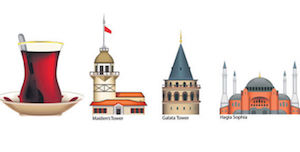Turkey's Very Own Emoji Keyboard Gives A Taste of Turkish Culture
 An exclusive emoji keyboard has been developed for Turkish users applicable for instant messaging platforms where 6 billion emojis are shared every day worldwide. The app features more than 450 icons including cultural ones like "simit," "eggs with sucuk," "quarter gold chain," "tea," "Turkish coffee" and "father figure." The most used icon, however, is "evil eye talisman" ("nazar boncuğu" in Turkish), a popular gift choice among travelers visiting Turkey.The app's creator, entrepreneur Deniz Hotamışlıgil, 31, who resides in Los Angeles, said that the app is Turkey's first local emoji keyboard. He said that he had the idea after seeing the need for emojis required to express precisely the necessary emotions when messaging in Turkish.
An exclusive emoji keyboard has been developed for Turkish users applicable for instant messaging platforms where 6 billion emojis are shared every day worldwide. The app features more than 450 icons including cultural ones like "simit," "eggs with sucuk," "quarter gold chain," "tea," "Turkish coffee" and "father figure." The most used icon, however, is "evil eye talisman" ("nazar boncuğu" in Turkish), a popular gift choice among travelers visiting Turkey.The app's creator, entrepreneur Deniz Hotamışlıgil, 31, who resides in Los Angeles, said that the app is Turkey's first local emoji keyboard. He said that he had the idea after seeing the need for emojis required to express precisely the necessary emotions when messaging in Turkish. "The designs and drawings of the app all belong to me. The software and the technology have been developed by a world-renowned team of 10 people. Half of the team is composed of international software developers including American developers," Hotamışlıgil further said. He said that the app features more than 450 icons in 10 main categories, such as location, tools, instruments, refreshments, vehicles, foods and sports. "When we decided to realize our idea for a Turkish emoji keyboard, a list of emojis popped up immediately due to the need. However, we were not satisfied with the data we had and decided to conduct extensive market research in Turkey and asked Turkish people about their needs. Our researched continued until 'Emojum' was released and we continued to make adjustments until the last minute. Now, the ball is in the users' court. One hundred percent domestic 'Emojum' is an emoji keyboard for all Turks."
Apart from "evil eye talisman," the other most popular icons on the keyboard are "the Blue Mosque," "coffee pot," "darbuka," "ferry," "simit," eggs with sujuk" and "goal." Hotamışgil said that the app features "design you own emoji" section for users to be able to express their emotions in the way they wish.
Stressing that the team is always open to innovation, Hotamışlıgil asked software developers who believe that they co-contribute their humor to the project to get in touch with him. Professor Filiz Aydoğan Boschele of Marmara University's Faculty of Communications also said that emojis appeared and became popular when traditional media platforms like radio and TV were taken down by new media technologies including the Internet, 4.5 G smartphones and tablet PCs. (AA)
Last modified onSaturday, 06 May 2017 10:07
Latest from Admin TOA
- The Young Star of the Gastronomy World Is The New Owner of Samdan
- From Dream to Reality, from Muş to Illinois: Zellano Home, the Largest Furniture Store Under One Roof in the USA!
- 300 migrants to be housed at shuttered Catholic church on Northwest Side in Chicago
- Turkish Philanthropy Funds Hosts 2024 Innovation and Social Impact Summit
- Turkish Stand-Up Sensation Hasan Can Kaya Embarks on U.S. Tour with Art Evi Production, in212 Production, and TAAS New York
